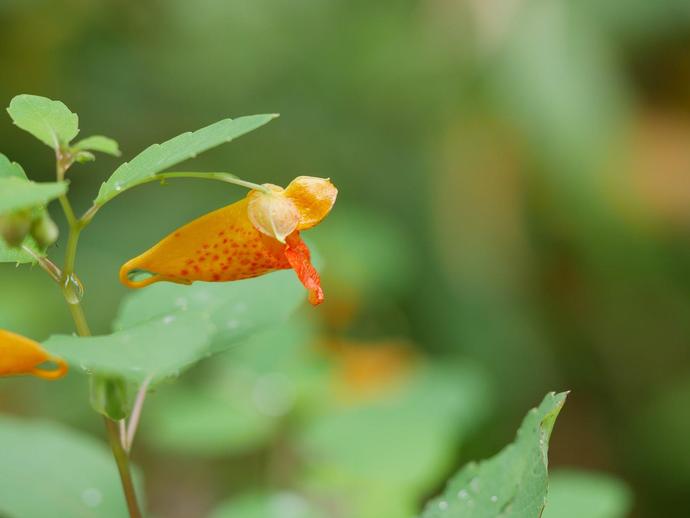September 24, 2020
These beautiful little flowers belong to common jewelweed (Impatiens capensis), an annual that can be found throughout much of eastern North America. You can find it in ditches and along creeks, and it blooms from the late spring into the early fall (it's in bloom right now, at least in my neck of the woods in Patrick County).
If you like having hummingbirds around, don't cut down any jewelweed you find on your property! Hummingbirds are one of the main pollinators of this plant, alongside bumblebees. Hummingbirds are particularly efficient pollinators for jewelweed because their long beaks allow them to get to the delicious nectar in the flower's nectar spur, which is that little curved tube you can see at the back of the flower.
The juice of the leaves and stems of jewelweed was long used by indigenous Americans as a treatment for poison ivy exposure. Peer-reviewed studies have shown that it works; if the juice is applied to skin that has come in contact with poison ivy, it helps prevent a rash from forming! The stem juice has also been confirmed to help treat athlete's foot, so if you have a bad case, consider a soothing barefoot stroll through the jewelweed.
On a side note, the scientific name "capensis" means "of the cape." This is because Dutch botanist Nicolaas Meerburgh, who identified the plant back in the 1700s, mistakenly thought it was native to southern Africa's Cape of Good Hope. The next time you make a mistake at work, you can take comfort in the fact that your error probably won't be remembered several centuries later. #BenInNature
ABOUT #BENINNATURE
Social distancing can be difficult, but it presents a great opportunity to become reacquainted with nature. In this series of posts, Administrator of Science Ben Williams ventures outdoors to record a snapshot of the unique sights that can be found in the natural world. New updates are posted Monday - Friday, with previous posts highlighted on the weekends.
NATURE PHOTO IDENTIFICATIONS
If you discover something in nature that you would like help identifying, be sure to message us right here on Facebook with a picture (please include location and date of picture) and we'll have our experts help you identify it!

 Hours & Admissions
Hours & Admissions Directions
Directions

